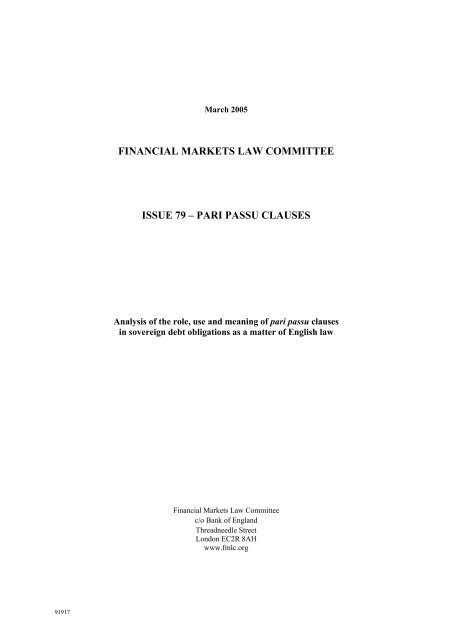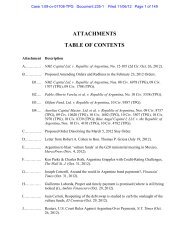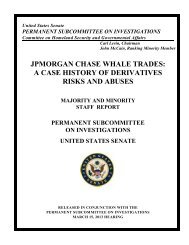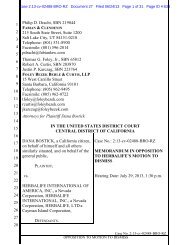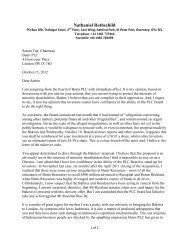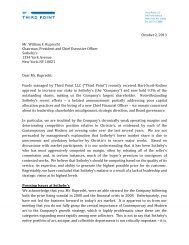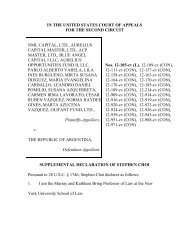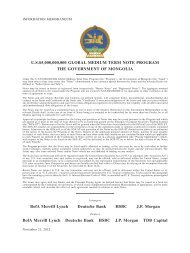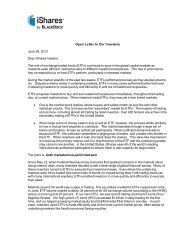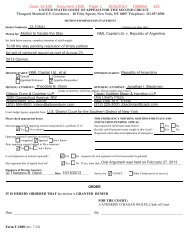FINANCIAL MARKETS LAW COMMITTEE ISSUE 79 – PARI PASSU CLAUSES
pari passu clauses - FT Alphaville
pari passu clauses - FT Alphaville
You also want an ePaper? Increase the reach of your titles
YUMPU automatically turns print PDFs into web optimized ePapers that Google loves.
March 2005<strong>FINANCIAL</strong> <strong>MARKETS</strong> <strong>LAW</strong> <strong>COMMITTEE</strong><strong>ISSUE</strong> <strong>79</strong> <strong>–</strong> <strong>PARI</strong> <strong>PASSU</strong> <strong>CLAUSES</strong>Analysis of the role, use and meaning of pari passu clausesin sovereign debt obligations as a matter of English lawFinancial Markets Law Committeec/o Bank of EnglandThreadneedle StreetLondon EC2R 8AHwww.fmlc.org91917
<strong>FINANCIAL</strong> <strong>MARKETS</strong> <strong>LAW</strong> <strong>COMMITTEE</strong><strong>ISSUE</strong> <strong>79</strong> <strong>–</strong> <strong>PARI</strong> <strong>PASSU</strong> <strong>CLAUSES</strong> WORKING GROUPChair:Deputy:Secretary:Lord Browne-WilkinsonBill Tudor John, Lehman BrothersPaul Phelps, Allen & Overy LLPArmel Cates, Clifford ChanceCharles Clark, LinklatersMarc Hutchinson, Slaughter and MayNiall Lenihan, European Central Bank *James Nadin, One Essex CourtJoanna Perkins, Financial Markets Law CommitteeCharles Proctor, Nabarro NathansonRoger Wedderburn-Day, Allen & Overy LLPPhilip Wood, Allen & Overy LLPAndrew Yianni, Clifford Chance* The views expressed in this paper are personal and should not be attributed in any way to the European Central Bank.i
CONTENTSPage1. Introduction.............................................................................................................................. 11.1 Background ............................................................................................................ 11.2 Executive summary ................................................................................................ 11.3 Structure of the report............................................................................................. 22. Analysis..................................................................................................................................... 42.1 Description of a typical pari passu clause.............................................................. 42.2 Sample pari passu clauses...................................................................................... 52.3 The two principal interpretations of the pari passu clause..................................... 52.4 The English law position........................................................................................ 93. Consequences of the Payment Interpretation ..................................................................... 133.1 Introduction .......................................................................................................... 133.2 Effect on the borrower's freedom to run its business or economy ....................... 133.3 Lender liability ..................................................................................................... 153.4 Implications for payment and settlement systems................................................ 163.5 Implications for restructuring sovereign debt....................................................... 163.6 The pari passu clause in the context of the contract as a whole .......................... 174. Analysis of Sample Clauses................................................................................................... 195. Conclusion .............................................................................................................................. 2210023-210<strong>79</strong> ICM:773519.12 ii
1. INTRODUCTION1.1 BackgroundThe purpose of this report is to analyse the role, use and, most importantly, the meaning, as amatter of English law, of pari passu 1 clauses in sovereign debt obligations. The preparationof this report has been prompted by recent litigation in the courts of Belgium, California, NewYork and England concerning the interpretation of these clauses. In this litigation, creditorswho had purchased sovereign debt that was in default argued, or attempted to argue, that thepari passu clause contained in that debt should prevent the sovereign debtor from makingpayments to other creditors without at the same time paying the litigating creditors on a prorata basis.The Financial Markets Law Committee (the “FMLC”), at a meeting on 27th November,2003, decided that it should establish a Pari Passu Clause Working Group (the “WorkingGroup”) to consider these issues and publish a report which would set out its opinion on theproper meaning of pari passu clauses in sovereign debt obligations as a matter of English law.1.2 Executive summaryA pari passu clause is a standard clause found in international syndicated bank loanagreements and bond issues. The clause is a covenant or a warranty that the bank loans andthe bonds “rank pari passu” with all the other unsecured debt of the borrower or issuer. Theclause appears in both corporate and sovereign debt obligations.Until recently it was thought that the clause prescribed only that on the insolvency of thedebtor unsecured claims, including the debtor obligations concerned, would rank pari passuor equally as a matter of insolvency or statutory law. The purpose was a statement,sanctioned by an event of default, as to equal ranking as a matter of law so that the creditorswere assured that on competition between creditors there was no mandatory provision forunequal payment.Recently another interpretation has found favour in court decisions in California and Belgium.This interpretation is that the clause in effect requires that, once the debtor is actually1 The Latin phrase “pari passu” means “in equal step” or “side by side”.10023-210<strong>79</strong> ICM:773519.12 1
insolvent, the debtor will in fact pay all its claims pro rata and could thus be prevented frompaying one creditor in full if the obligations concerned went unpaid.This report asserts that, so far as English law is concerned, the wide “payment” interpretationis incorrect and that the “ranking” interpretation is the proper construction. There are threereasons which support this assertion:• The principal reason is that the “payment” interpretation would not be acceptable todebtors and indeed to creditors, and would be unworkable. In short, it would offend the"business commonsense" principle used by English courts when construing a contract. Inparticular, it would lead to the result that once the debtor actually became insolvent thedebtor would not be able to make any ordinary course of business payments necessary toenable the debtor to maintain its business. Hold-out creditors in pursuit of a bargainingposition against other creditors could prevent payments and bring the business to apremature halt. An action of this type could be used to seriously disrupt payment systemsthrough which the debtor made its payments and securities settlement systems throughwhich the debtor paid for investments. Hence if the payment interpretation were correct,the pari passu clause would be prejudicial not only to debtors but also to creditors bymaking it impracticable for all creditors to sustain the debtor's business if only one ofthem objected.• Another reason is based on the principles of English rules of contract construction that thewords used be given their ordinary and natural meaning and that they should beconsidered in the context of the entire transaction. The language itself on the most literalinterpretation requires a “rank” of the claims, i.e. a legal rank. It does not require paripassu “payment”. In addition, other provisions are typically found in debt obligationswhich do require equal payment and this suggests that the pari passu clause was notintended to require equal payment.• The final reason is based on an analysis of English case law which provides persuasiveauthority against the payment interpretation.The remainder of this paper provides a detailed analysis of the issues.1.3 Structure of the reportSections 2.1 to 2.3 of this report describe a typical pari passu clause and the two principalinterpretations of such a clause that exist today. Because the pari passu clause is acontractual provision, section 2.4 then identifies the principles for construing contracts10023-210<strong>79</strong> ICM:773519.12 2
governed by English law. The most important of these in the context of this report is the“business commonsense” principle for construing commercial contracts described by LordDiplock in the Antaios 2 case although it is also helpful to analyse the actual language used.Section 2.4 also contains an analysis of the most helpful English case law on the pointalthough this provides only persuasive authority against the payment interpretation.Adopting the business commonsense principle of contractual construction, section 3 looks indetail at the consequences that would follow from the implementation of the paymentinterpretation and concludes that these would offend that principle.Picking up on another important principle of contractual construction, section 4 provides ananalysis of the actual wording used and determines that this too supports the rankinginterpretation over the payment interpretation.Finally, section 5 sets out the conclusions reached in this report.2 Antaios Compania Naviera S.A. v. Salen Rederierna A.B. 1 A.C. 191.10023-210<strong>79</strong> ICM:773519.12 3
2. ANALYSIS2.1 Description of a typical pari passu clausePari passu clauses are a standard feature in cross-border 3 unsecured 4 debt obligations. Theyare found in both loan agreements and securities issues.In a loan agreement, the pari passu clause is often drafted as follows:“The payment obligations of the borrower under this Agreement rank atleast pari passu with all its other present and future unsecured obligations.”In an international securities issue, the pari passu clause is usually found in the “status” or“ranking” condition and is often drafted as follows:“The bonds and the coupons are direct, unconditional and unsecuredobligations of the issuer and rank and will rank at least pari passu, withoutany preference among themselves, with all other outstanding, unsecured andunsubordinated obligations of the issuer, present and future.”The standard formulation for a bond pari passu clause therefore has two limbs:(i)(ii)the internal limb: that the bonds rank pari passu with each other 5 ; andthe external limb: that the bonds rank pari passu with other unsecured indebtednessof the issuer.The internal limb is not found in loan agreements.As a matter of contractual analysis, the standard loan agreement pari passu clause is arepresentation that, as a matter of fact, the payment obligations of the borrower rank in themanner described. This clause may be complemented by a corresponding covenant underwhich the borrower promises that the payment obligations will rank pari passu as describedin the representation. In the context of the standard securities issue provision, the pari passu3 A pari passu clause is often omitted in domestic debt obligations.4 The clause is inapplicable in the case of secured lending. If a pari passu clause was expressed to apply to secured, rather than unsecured,indebtedness it would be a concealed negative pledge clause.5 One reason for the internal ranking limb was probably to deal with the argument that the ranking of bonds depended on their date of issue <strong>–</strong>a point which was pertinent in relation to secured bonds where debentures of the same series might be issued in tranches at different timesbut were intended to enjoy equal ranking as regards the security but which has no relevance to modern unsecured bond issues.10023-210<strong>79</strong> ICM:773519.12 4
clause is both a representation as to the present ranking, and an undertaking as to the futureranking, of the securities. A court would therefore view the representation as a promise thatthe particular ranking exists as at the date of the contract and, where there is an undertaking, apromise that the future conduct of the borrower will ensure that the particular ranking willexist during the life of the contract.There are, of course, many different ways to draft this clause and this report will consider theprincipal variations in more detail below. The pari passu clauses found in sovereign debtobligations mirror these standard formulations. Sovereign debt obligations, however,frequently limit the scope of the pari passu clause to “external indebtedness”, which isusually defined as unsecured indebtedness denominated in a currency other than that of thesovereign debtor or by reference to the residence of the holder of the debt so that it does notcapture indebtedness targeted at domestic creditors or investors.2.2 Sample pari passu clausesIn preparing this report, the Working Group has conducted a survey of the pari passu clausescontained in a number of public sovereign bonds issued during the period beginning on 1stJanuary, 1999 and ending on 31st January, 2004. Where a particular sovereign issued anumber of bonds during this period, only one example was included in the survey. Based onthis survey, this report asserts that, save in one highlighted case 6 , the differences in the actualdrafting used in these bonds are not material to its conclusion as to the proper meaning of thepari passu clause under English law. Examples of the two principal variations are set out,and analysed, in section 4.2.3 The two principal interpretations of the pari passu clause(i)Corporate debt obligationsMost jurisdictions have in place an insolvency system that provides for the orderlydistribution of a company’s assets once it has been liquidated. A lender is clearlyinterested to know where its indebtedness would rank in such a distribution if theborrower became insolvent. This explains why, as was seen in section 2.1 above, it iscommon for there to be a representation as to where the particular indebtedness ranksat the date of the agreement. If, for example, the borrower is an English company, adebtor who obtains a representation that its debt is “senior” knows that it will rank10023-210<strong>79</strong> ICM:773519.12 5
after any secured indebtedness, but before any subordinated indebtedness incurred bythat borrower. The current bankruptcy rule for such an English company is that,except for debts which are made preferential (as to which see the next paragraph) orsubordinated by specific statutory direction, all ordinary (or "senior") debts rankequally between themselves and shall be paid in full or, in the event of a deficiency ofassets to meet them, abate in equal proportions between themselves 7 .However, there may be a number of situations in which indebtedness incurred by aborrower may acquire seniority to that of the lender. For example:(a)(b)In many jurisdictions, taxes and wages rank in priority to the claims of otherunsecured creditors in the liquidation of a corporation.In some countries retail depositors with banks or other financial institutionsor the holders of insurance policies of an insurance company in liquidationmust be paid out before other creditors.(c) In the Philippines, an unsecured creditor can and, until recently, in Spain 8could, by publicising the relevant agreement in the prescribed manner beforea public official and by paying a documentary tax, achieve priority overunsecured creditors who do not publicise their agreement and, possibly, alsoover other unsecured creditors whose agreements are subsequentlyformalised.(d)Debt securities may under local corporate laws rank for payment inliquidation according to their date of issue.There is little that a lender can do in relation to (a) and (b) above 9 , but a covenant bythe borrower that the indebtedness will rank at least pari passu with all other seniorindebtedness should give the lender some comfort that the borrower will not assistany other lenders in a way that would give their indebtedness priority. The Spanishnotarisation procedure described in (c) above, for example, used to require theparticipation of the lender. Similarly, the disclosure language relating to a bond6 See section 4.7 Gough, Company Charges (2nd edition) at p. 948.8 Under the "Ley Concursal" (Ley 22/2003) which came into force on 1st September, 2004, all unsecured creditors, whether or not theirobligations are contained in a public deed, are required to be paid on a pro rata basis upon the insolvency of the debtor.9 Indeed, it is common to see an exception in corporate pari passu clauses for “obligations mandatorily preferred by law”.10023-210<strong>79</strong> ICM:773519.12 6
issued by the Philippines' notes that the Philippines believes that its cooperation isrequired in order to obtain this notarisation.The purpose of the pari passu clause in corporate debt obligations, therefore, is toprovide a commitment or warranty that on a liquidation or a forced distribution ofassets by reason of insolvency, unsecured creditors will be entitled to a pro ratapayment i.e. that unsecured creditors have in law pro rata claims against the assets ofthe insolvent borrower.(ii)Sovereign debt obligationsThe fundamental point that most commentators make when discussing the meaning ofthe pari passu clause in sovereign debt obligations is that sovereigns, unlikecorporates, cannot become insolvent. In the first place a government cannot beliquidated because it has insufficient assets to meet its liabilities and, althoughgovernments may be unable to, or refuse to, pay their debts, there are no proceduresequivalent to the bankruptcy procedures for a domestic corporation whereby agovernment’s assets can be compulsorily realised and the proceeds distributed to itscreditors. As a result, the purpose of a pari passu clause in a sovereign debtobligation must be different.There are two principal interpretations of what the pari passu clause means insovereign debt obligations. The first is a “ranking” interpretation that argues that thepari passu clause merely affirms that the obligations rank and will rank pari passuwith all other unsecured debt as a matter of mandatory law and the second is a“payment” interpretation that argues that the borrower has undertaken that it will infact pay its obligations pro rata when it is unable to pay all of them in full.Until recently, the ranking interpretation was the only interpretation and, accordingly,the only purpose of the clause was believed to be to prevent sovereigns from“earmarking” revenues of the government or allocating foreign currency reserves to asingle creditor or, more generally, to prevent the sovereign from adopting legalmeasures which have the effect of preferring one set of creditors against the others.In other words, although a sovereign cannot be subjected to a formal bankruptcy10023-210<strong>79</strong> ICM:773519.12 7
egime, it can promise not to pass a law that would legitimise a preference given toone unsecured creditor over another 10 .However, the payment interpretation of the pari passu clause seems to have recentlybeen accepted by the Cour d'Appel de Bruxelles (Brussels Court of Appeal) in a casebrought by an investment fund called Elliott Associates 11 , which had purchaseddefaulted Peruvian indebtedness. This payment interpretation is neatly summed-up inthe following opinion from Professor Andreas Lowenfeld of New York University,which was obtained by Elliott Associates for the purpose of the Peru litigation.Professor Lowenfeld opined that the meaning of the pari passu clause was clear:“I have no difficulty in understanding what the pari passu clausemeans: it means what it says <strong>–</strong> a given debt will rank equally withother debt of the borrower, whether that borrower is an individual, acompany, or a sovereign state. A borrower from Tom, Dick, andHarry can’t say “I will pay Tom and Dick in full, and if there isanything left over I’ll pay Harry.” If there is not enough money to goaround, the borrower faced with a pari passu provision must pay allthree of them on the same basis.Suppose, for example, the total debt is $50,000 and the borrower hasonly $30,000 available. Tom lent $20,000 and Dick and Harry lent$15,000 each. The borrower must pay three fifths of the amountowed to each one <strong>–</strong> i.e., $12,000 to Tom, and $9,000 each to Dick andHarry. Of course the remaining sums would remain as obligations ofthe borrower. But if the borrower proposed to pay Tom £20,000 infull satisfaction, Dick £10,000 and Harry nothing, a court could andshould issue an injunction at the behest of Harry. The injunctionwould run in the first instance against the borrower, but I believe10 For this reason, it would not make sense to insert the exception typically found in corporate pari passu clauses relating to “obligationsmandatorily preferred by law”, since this would give the sovereign an escape route for passing laws in the future that have the effect ofpreferring a particular creditor.11 Elliott Assocs., L.P., General Docket No. 2000/QR/92 (Court of Appeals of Brussels, 8th Chamber, 26th September, 2000). Other recentlitigation which has concerned the proper interpretation of the pari passu clause has included: Republic of Nicaragua vs. LNC InvestmentsLLC and Euroclear Bank S.A./N.V. (litigation in Belgium); Red Mountain Fin, Inc. v. Democratic Republic of Congo and Nat'l Bank ofCongo (litigation in California, U.S.A.); Kensington Int'l Ltd. v. Republic of Congo (litigation in England); and Macrotechnic Int'l Corp v.The Republic of Argentina and EM Ltd v. The Republic of Argentina (current litigation in New York, U.S.A.).10023-210<strong>79</strong> ICM:773519.12 8
(putting jurisdictional considerations aside) to Tom and Dick aswell.” 122.4 The English law positionGiven that two different interpretations exist, this part of the report considers the principleswhich an English court would use to construe a pari passu clause in order to determine itsproper meaning.(i)Construction of contractual termsThe object of all construction of the terms in a written agreement is to discovertherefrom the intention of the parties to the agreement 13 . Every contract is to beconstrued with reference to its object and the whole of its terms, and accordingly, thewhole context must be considered in endeavouring to collect the intention of theparties, even though the immediate object of inquiry is the meaning of an isolatedword or clause.An important principle of modern English contract law to be considered whenconstruing a commercial contract is that the words used must be given a sensible andcommonsense business meaning. This principle was laid down by the House ofLords in the Antaios 14 case. In one part of his judgment, Lord Diplock stated “ifdetailed semantic and syntactical analysis of words in a commercial contract is goingto lead to a conclusion that flouts business commonsense, it must be made to yield tobusiness commonsense.” Lord Diplock's words were later approved by LordHoffmann in Investors Compensation Scheme Ltd. v. West Bromwich BuildingSociety 15 , the leading modern authority concerning the construction of commercialcontracts.Against the background of the general principles to be applied when construing acontract, there are number of “rules” of construction, which the modern law wouldregard as merely guidelines or assumptions as to what the court may regard as thenormal use of language and which assist judges to arrive at a reasonable interpretationof the parties' intentions, though subject to examination of the relevant circumstances12 Extract reproduced from version set out in Buchheit and Pam, The Pari Passu Clause in Sovereign Debt Instruments (working paper, draftdated 11th December, 2003).13 Marquis of Cholmondeley v. Clinton (1820) 2 Jac. & W. 1, 91.14 Antaios Compania Naviera S.A. v. Salen Rederierna A.B. 1 A.C. 191.10023-210<strong>79</strong> ICM:773519.12 9
surrounding the transaction. One such “rule” of construction is “established judicialconstruction”: where the same words or contractual provisions have for many yearsreceived a judicial construction, the court will suppose that the parties havecontracted upon the belief that their words will be understood in the accepted legalsense. This rule favours the ranking interpretation.(ii)Analysis of case lawThe most important English law case in this context is Kensington Int’l Ltd. v.Republic of the Congo 16 . In the Kensington case, a fund purchased defaultedindebtedness under a loan agreement (governed by English law) made in April 1984.On 20th December, 2002, the claimant sought a money judgment against the Congo,together with a claim for specific performance (among other grounds, on the basis ofthe pari passu clause 17 contained in the loan agreement) to prevent the Congo makingpayments to other creditors.The claim for specific performance was considered by Tomlinson J. The Congo wasnot represented at those proceedings. Counsel for Kensington noted the lack of directEnglish law authority on this point and then rehearsed the two basic interpretations ofwhat the pari passu clause meant. He went on to assert that the pari passu clausecontained in the loan agreement was plainly a sharing clause 18 , compelling Congo topay the claimant on a pro rata basis when it pays other creditors. Counsel’ssubmission was based on the following considerations:(a) the literal meaning of the words “pari passu 19 ” ;(b)(c)the decision in Bowen v. Brecon Railway Company 20 ,which counsel arguedstrongly suggests that the pari passu clause means that money to bedistributed should be distributed or paid on a pari passu basis;the actual wording used, with an emphasis on the words “and priority ofpayment”. Counsel suggested that it is difficult to “accord any sensible15 [1998] 1 W.L.R. 896.16 16th April, 2003, unreported. Approved by the Court of Appeal [2003] EWCA Civ 709.17 The relevant clause of the loan agreement contains an undertaking by the Congo “to procure that the claims of all other parties under [theloan] agreement will rank as general obligations of the People’s Republic of the Congo, at least pari passu in right and priority of paymentwith the claims of all other creditors of the People’s Republic of the Congo . . .”.18 True “sharing” clauses are considered in further detail at section 3.6 below.19 See section 4 of below for a further discussion of this point.20 (1866-67) LR 3 Eq 541.10023-210<strong>79</strong> ICM:773519.12 10
meaning to the emphasised words if payments are not to be made paripassu”;(d)(e)the argument that as a sovereign cannot be liquidated, the meaning of a paripassu clause in the context of a sovereign borrower must be different to themeaning of a pari passu clause in the context of a corporate borrower.Counsel argued that the clause, when appearing in a sovereign loan, must bethere to provide some further protection to creditors to compensate for theirinability to invoke insolvency procedures against the state and that protection,according to Kensington’s counsel, must be an enforceable obligation on thestate to pay creditors on a pro rata basis;overseas authority having some indirect bearing on the point:- Merchant Bills Corporation Limited v. Permanent Nominees AustraliaLimited 21 ;- the Red Mountain Finance 22 case; and- the Elliott case (see above).Tomlinson J. decided that he could attach “little weight” to the decisions in the RedMountain Finance and Elliott cases because:- “no reasons for [the decision]” in the Red Mountain Finance action had beenshown to him and because the Congo had not been represented in that case;and- the Elliott action was an ex parte decision and the order was directed towardsa bank (Euroclear) and not towards the Peruvian state.Tomlinson J. also expressed reservations about the legal correctness of the broaderinterpretation of the pari passu clause on the basis of the discussion on pari passuclauses found in the Encyclopaedia of Banking Law.21 1972-73 Australian Law Reports 565.22 Case No. CV 00-0164 R (C.D. Cal. 29th May, 2001).10023-210<strong>79</strong> ICM:773519.12 11
In the end, Tomlinson J. denied Kensington’s claim for an injunction on othergrounds and this was upheld on appeal. Accordingly, his views expressed on the paripassu clause are of persuasive authority only.In addition, in the absence of direct English case law on a particular point, an Englishcourt might find the decisions of a Commonwealth or United States courtpersuasive 23 . However, having reviewed a number of other English andCommonwealth authorities 24 , the Working Group concluded that the standardformulation pari passu clause has not received a particular judicial constructionwhich would assist in ascertaining the intentions of the parties.(iii)Analysis of the actual languageIn the absence of clear judicial authority on the point, a careful review of the wordsused in the pari passu clause is also necessary in order to help determine its meaning.This is because the starting point in construing a contract is that words are to be giventheir ordinary and natural meaning. This is not necessarily the dictionary meaning ofthe word, but that in which it is generally understood.An analysis of the ordinary and natural meaning of the principal variations in theactual language used in pari passu clauses is set out in section 4 below. This alsofavours the ranking interpretation.23 An interesting example of an instance in which an English court relied on a U.S. precedent in a sovereign context is Crescent Oil v. BancoNacional de Angola (unreported), 28th May, 1999 Com Ct., where Cresswell J. applied de Sanchez v. Banco Central de Nicaragua, 770 F.2d 1385 (5th cir. 1985), a decision of the United States Court of Appeals for the Fifth Circuit.24 See: Bowen v. Brecon Railway Co (1866-67) LR 3 Eq 541, Murray v. Scott (1884) 9 AC 519, HL, Small v. Smith (1885) 10 AC 119, ReMidland Express, Limited, [1914] 1 Ch. 41, Merchant Bills Corporation Ltd v. Permanent Nominees (Aust) Ltd 1972-73 Australian LawReports 565.10023-210<strong>79</strong> ICM:773519.12 12
3. CONSEQUENCES OF THE PAYMENT INTERPRETATION3.1 IntroductionThe consequences of the payment interpretation are “background knowledge which wouldreasonably have been available to the parties in the situation in which they were at the time ofthe contract” 25 and are therefore relevant in construing the intention of the parties at the timethat they made the contract. In particular, based on the views expressed by Lord Diplock inthe Antaios case, if these consequences would produce results which offend “businesscommonsense”, it is unlikely that a court would be prepared to find in favour of the paymentinterpretation of the pari passu clause.The payment interpretation of the pari passu clause would provide, in effect, that theborrower agrees that, once it is unable to pay all of its debts as they fall due or is otherwiseinsolvent, it will not pay any other unsecured indebtedness unless at the same time its pays theindebtedness in question in the same proportion by amount as that in which it pays the otherindebtedness. This report asserts that the practical consequences that follow from thepayment interpretation are such that the parties would not have agreed that the pari passuclause should have that meaning had they been presented with these consequences at the timethat they entered into their contract. The principal consequences are set out below.3.2 Effect on the borrower's freedom to run its business or economyIn times of economic distress, a company or a state will wish to prioritise payments todifferent lenders. Such prioritisation usually takes place for the practical reason that using itsresources in this way prevents the business (in the case of a company) or the economy (in thecase of a state) from grinding to a halt.The practical need for sovereigns to prioritise payments has been noted for a number of years.In State Insolvency and Foreign Bondholders 26 , the authors note that when a sovereign is infinancial distress “[f]airness and justice in the adjustment of public debts require that allbondholders be treated alike. The principle of equality, however, does not signify uniformityof treatment. As will appear presently, the grading and grouping, according to their intrinsicmerits, of claims with respect to the utilization of the available assets of the debtor have, in25 Per Lord Hoffmann in Investors Compensation Scheme Ltd v. West Bromwich Building Society [1998] 1 W.L.R. 896.26 Borchard, State Insolvency and Foreign Bondholders Vol. 1, General Principles (1951) (Yale University Press).10023-210<strong>79</strong> ICM:773519.12 13
fact, been expressly recognized in some of the major adjustment plans. All that the principleimplies is that preferential treatment shall not be accorded to particular classes of bondholderswithout valid cause” 27 . The authors go on to argue that a principle of differentiation existswhen a sovereign becomes insolvent:“While the private law of bankruptcy is governed by the principle ofequality of claims in the distribution of the debtor's assets . . . differentialtreatment of the holders of foreign government bonds in case of default isthe ordinary rule. The reason therefor lies in the semipolitical nature ofgovernment loans and in the great variety of forms and purposes for whichsuch loans are issued” 28 .The authors then cite examples of how sovereign debtor rescheduling plans havedifferentiated between various creditors. One example is where the obligations are secured.Another is that “the significance of a loan for the economic or political life of the country mayprovide the reason for granting [that indebtedness] a priority or preference. Thus, the LeagueLoans Committee claimed priority for the post-war loans issued under the auspices of theLeague, on the ground that these loans had been devoted to the economic and financialrehabilitation of the countries concerned”.An analogy can clearly be drawn here with the indebtedness granted by the World Bank andInternational Monetary Fund in modern times.The consequence of the payment interpretation, however, is that if the borrower is a sovereignstate unable to service its foreign currency debt as it falls due, it will not be allowed to payany of its senior creditors in full. These include the IMF, the World Bank and any of theother multilateral organisations that may have lent it money. The restriction potentially biteseven wider than this and would prevent the borrower from paying in full creditors who havesold it commodities or licensed it intellectual property rights or from paying in full itsgovernment ministers, civil servants, police force, armed forces, judges and state teachers.It is argued that if the parties were presented with these consequences of the paymentinterpretation of the pari passu clause at the date that they entered into their contract, theywould have concluded that this meaning does not make commercial sense and would have27 Ibid at pp. 337-338.28 Ibid at p. 340.10023-210<strong>79</strong> ICM:773519.12 14
provided for extensive exemptions from its application. Accordingly, it is submitted that theparties could not have intended the pari passu clause to have the payment interpretation.3.3 Lender liabilityCreditors do not readily agree to lend money to debtors on terms that could potentially exposethem to liability to third parties. This is not a risk that they agree to assume as part of thecommercial deal to lend money to a debtor. However, lender liability is a potentialconsequence of the payment interpretation of the pari passu clause.As will be seen at section 3.6 of this report “sharing clauses”, which are intended to require apro rata distribution of recovery proceeds and “most favoured debt clauses”, are usuallysubstantially longer than the typical pari passu clause and are often heavily negotiated. Onereason for extensive negotiation and detailed drafting of such clauses is that lenders do notwish to be exposed to potential liability to third parties as a result of the obligations that theyhave agreed to in a loan agreement. When negotiating sharing clauses and most favoureddebt clauses, lenders are mindful that they may be exposing themselves to liability in tort orotherwise for interfering in third party contracts. The payment interpretation of the pari passuclause could expose lenders to the same potential liabilities. If the payment interpretation iscorrect, lenders may also be exposing themselves to liability as constructive trustees if theyare on notice that there are other unpaid lenders of the same debt or other debt incurred by thesovereign borrower.It is submitted that the lenders in a standard international syndicated loan or bond issue wouldnot have intended the pari passu clause to expose them to such liabilities. Indeed, potentialliability as a consequence of a particular construction was relied upon by Lord Diplock in theMiramar 29 case as a reason to favour a different construction. In that case he said: "Mr Lords,I venture to assert that no business man who had not taken leave of his senses wouldintentionally enter into a contract which exposed him to a potential liability of this kind; andthis, in itself, I find to be an overwhelming reason for not indulging in verbal manipulation ofthe actual contractual words used.".This consequence provides further support to the argument that the payment interpretation isnot correct because it would not make business sense for a lender to agree to such potentialliabilities to third parties.29 Miramar Maritime Corporation v. Holborn Oil Trading Ltd [1984] A.C. 676 at 685.10023-210<strong>79</strong> ICM:773519.12 15
3.4 Implications for payment and settlement systemsActions by creditors based on the payment interpretation of the pari passu clause could beused to interfere with international payment and securities settlement systems by stoppingpayments by the borrower to the system or payments by the system to the borrower. Indeed,such action was taken against Euroclear in the Elliott litigation. Commercial banks areintegrated into the world’s payment and settlement systems so that attacks on them asinnocent bystanders could have systemic consequences in upsetting the requirement forfinality in systems which deal with very high volumes at high speeds in circumstances whereliquidity is essential. As an operational matter it would be extremely difficult to try toadminister payment instructions which may be the subject of a court injunction along the linesof that obtained by Elliott Associates in the Peru litigation.In addition to these practical reasons for not favouring the payment interpretation, the publicpolicy objective of preventing this sort of disruption is mirrored in the Directive of theEuropean Parliament and of the Council of 19th May, 1998 on settlement finality in paymentand securities settlement systems, 98/26/EC, OJ L 166, 11/06/1998, p.45 (the “SettlementFinality Directive”). The preamble to the Settlement Finality Directive outlines the policy ofthe European Union in this area. The recitals note, among other things, that the SettlementFinality Directive aims at contributing to the efficient and cost effective operation of crossborderpayment and securities settlement arrangements in the European Community, and thatthe reduction of systemic risk requires in particular the finality of settlement. It is noted thatthe provisions of the Settlement Finality Directive do not prohibit the kinds of attachmentproceedings pursued in the Elliott case 30 .3.5 Implications for restructuring sovereign debtOne particular mischief caused by the payment interpretation is the implications that followfrom it in the context of restructuring sovereign debt. As is noted from the facts of the Elliotcase, a sovereign debt restructuring is usually effected through an exchange offer wherebyexisting debt obligations are exchanged for new debt obligations on terms more favourable to30 Under Article 9 of the Belgian Act of April 28, 1999, (EU settlement finality directive), as modified by Article 15 of the Belgian Act ofNovember 19, 2004, no cash settlement account with a settlement system operator or agent nor any transfer of money to be credited to suchcash settlement account, via a Belgian or foreign credit institution, may in any manner whatsoever be attached, put under trusteeship orblocked by a participant (other than the settlement system operator or agent), a counterparty or a third party. The amendment, which isreflected in italics, was published in the Belgian State gazette of December 28, 2004 and entered into force in January 2005. As noted by theEuropean Central Bank (ECB) when consulted on the draft Belgian legislation, “the draft law enhances legal certainty in relation topayments through payment and settlement systems and thus fosters the safety and efficiency of payment and settlement systems”. SeeOpinion of the European Central Bank of 16 March, 2004 at the request of the Belgian Ministry of Finance (CON/2004/9), para 9, publishedon the ECB’s website at www.ecb.int.10023-210<strong>79</strong> ICM:773519.12 16
the debtor. Those creditors who decline to accept the exchange offer are referred to as“holdout” creditors.A theme that pervades throughout this area is that the orderly and expeditious resolution ofsovereign debt crises in a manner beneficial to both debtors and creditors is a policy objectiveto be pursued (see, for example, the Statement of Interest filed by the United States in theArgentina litigation). In this regard, recent statements have been published by the G-10 andG-7 regarding the important contribution which appropriately drafted terms and conditionsincluded in sovereign debt instruments can play in the resolution of sovereign debt crises 31 .From the sovereign debtor's perspective and from the perspective of the majority of thecreditors who wish to restructure the defaulted indebtedness in order to maximise thedividend they will receive as a class, the use of the pari passu clause as a tool to disrupt theprocess does not make business sense. Time and valuable resources would need to beexpended defending actions based on the payment interpretation of the pari passu clause.Accordingly, it is again asserted that the parties to the agreement, if presented with thisconsequence of the payment interpretation of the pari passu clause, could not have intended itto have that meaning.3.6 The pari passu clause in the context of the contract as a wholeWhen considering what the parties to an agreement intended a particular clause in a contractto mean, it will be highly relevant to consider other clauses in that agreement and what theparties meant by them as this may assist in determining the meaning of the clause in question.In this context, there are examples of clauses which are designed to achieve pro rata paymentand, significantly, are often found along side the standard pari passu clause. The mostimportant for these purposes are the “sharing clause” and the “most favoured debt” clause.A sharing clause is typically found in a syndicated loan agreement and is designed to ensurethat any disproportionate payment received by one member of the syndicate will be sharedrateably with all the rest 32 . It is important to note that:31 "See, for example, Statement of G-7 Finance Ministers and Central Bank Governors, Washington DC, 27th September, 2002;Communiqué of the Ministers and Governors of the Group of Ten, Washington DC, 27th September, 2002; and Report of the G-10 WorkingGroup on Contractual Clauses, September 2002, published on the website of the Bank for International Settlements athttp://www.bis.org/publ/.32 It should be noted that sharing clauses (or even the concept) would never have been put in an early eurobond as those bonds wereinvariably issued in definitive bearer form and the clearing systems did not exist at the time. As a consequence, neither the issuer nor thebondholders would have been able to identify the other holders and so, as a practical matter, sharing would not have been possible. Thebearer nature of the bonds would also create difficulties if the effect of knowingly receiving more than one's correct share were to create aconstructive trust of the moneys: neither the trustees nor the beneficiaries would be readily identifiable. It is understood that a sharingclause could not be included even today since the clearing systems will not accept securities which impose or purport to impose obligations10023-210<strong>79</strong> ICM:773519.12 17
(a)(b)syndicated loan agreements with sharing clauses often include pari passu clauses too;andsharing clauses are designed to protect a narrowly defined set of creditors whereas apari passu clause potentially applies to a broad range of unsecured debtors.These two considerations suggest that the two clauses aim to achieve different ends and,consequently, that the pari passu clause should not be given the payment interpretation.A “most favoured debt” clause is typically found in a work-out agreement for rescheduling aborrower’s debt. A “most favoured debt” clause usually provides that if any other foreigncurrency debt having the same maturity as the rescheduled debt is paid out more quickly, thenthe borrower must repay the rescheduled debt. The clause will then go on to exclude certaincategories of debt which can be paid in priority, for example IMF debt, trade debt, publicbonds and other agreed categories. The reason for these exceptions is to allow the sovereignto run its economy and it is submitted that the absence of such exceptions from the standardpari passu clause tends to suggest that, properly construed, it is not intended to require equalpayments.The clauses examined in the previous paragraph are rarely expressed to apply to all seniorindebtedness in the way that would follow if the payment interpretation of the pari passuclause was correct. Where a wider equality is desired, creditors can and do draft anappropriate clause <strong>–</strong> a most favoured debt clause, a negative pledge, a pro rata sharing clause,a provision for payment to a trustee of a bond issue on default who then pays bondholders ona pro rata basis, or a cross-default clause. Neither the sharing clause nor the most favoureddebt clause prohibits all unequal payments. It must therefore be questioned why, if the paripassu clause already achieves pro rata payment, parties would wish to include “sharing”,"pro rata distribution of recovery proceeds” or “most favoured debt” clauses. Their inclusionstrongly suggests that the pari passu clause was never intended to require pro rata payment.on the holders. However, where bonds are issued under a trust structure, the obligation imposed on the trustee to pay bondholders pro ratahas some consequences which are similar in effect to a sharing clause.10023-210<strong>79</strong> ICM:773519.12 18
4. ANALYSIS OF SAMPLE <strong>CLAUSES</strong>Further support for the ranking interpretation can be gained through an analysis of the actualwording used in two sample clauses identified from the survey referred to in section 2.2above. It is concluded that the language itself requires a “rank” of the claims, rather thanrequiring pari passu payment in fact. The two clauses relate to bond issues by the Republicof Estonia (in June 2002) and the Republic of Croatia (in February 2001) and are set outbelow:Republic of Estonia:“The Notes and Coupons rank and . . . will rank pari passu, without anypreference among themselves, with all other outstanding unsecured andunsubordinated obligations of the Issuer, present and future.”Republic of Croatia:“The Notes and Coupons rank pari passu, without any preference amongthemselves, and at least pari passu in right of payment with all other presentand future unsecured obligations of the Republic, save only for suchobligations as may be preferred by mandatory provisions of applicable law.”The Republic of Estonia clause does not contain any reference to the word “payment” in thefinal sentence. This report therefore asserts that the operative words are “rank pari passu”.The word “rank” means:“Arrange . . . in a rank or in ranks; arrange in a row or rows, set in line . . .Assign to a certain rank in a scale or hierarchy; classify, rate; include withina specified rank or class (foll. by among, with, etc.) . . . Occupy a certainrank in a hierarchy; belong to a specified rank or class (foll. by among, with,etc.); be on a par with . . .” 33There is nothing within this definition that suggests pro rata payment in fact. Accordingly,this report concludes that the clause merely asserts legal ranking and does not require pro ratapayment.33 Definition found in Shorter Oxford English Dictionary.10023-210<strong>79</strong> ICM:773519.12 19
Turning to the Republic of Croatia's clause, it will be noted immediately that this clausecontains the additional words “in right of payment” after the words “pari passu”. It isimportant, therefore, to examine whether or not these additional words justify this clausebeing given the payment interpretation. It is submitted that they do not for the followingreasons.(i)(ii)(iii)(iv)The words are similar to the formulation Professor Lowenfeld opined upon in theNicaragua litigation, which contained the phrase “. . . ranking at least pari passu inpriority of payment and in rank of security”. They are also similar to the words usedin the Kensington case, which read “. . . pari passu in right and priority of payment”.It is worth considering Professor Lowenfeld's arguments here as he characterises hisview as the “plain meaning” of the clause. Professor Lowenfeld's principal argumentis that the words “rank” and “pay” are used interchangeably in the relevant pari passuclause: “By agreeing to rank all the holders of its debt pari passu in priority ofpayment, the issuer of the debt obligates itself not to rank one creditor higher andanother lower, i.e., not to pay one creditor while declining to pay another” 34 . Thedictionaries do not support the contention that to say that one will not rank onecreditor higher or lower than another is the same thing as saying that one will not payone creditor while declining to pay another. The key words, again, are “rank paripassu” and not “payment”.It can be argued that the addition of the words “in right of payment” is only meant toclarify that other rights attached to the indebtedness (such as maturity date, interestrate, etc.) are irrelevant to the pari passu ranking of the obligations. It follows,therefore, that the addition of the words does not require pro rata payment in fact.The Kensington case involved a clause that referred to “payment”. As has alreadybeen seen, Tomlinson J. did not seem to be persuaded by counsel's argument thatlooking at the actual wording used, with an emphasis on the words “and priority ofpayment”, suggested that it was difficult to “accord any sensible meaning to theemphasised words if payments are not to be made pari passu”.The Working Group discovered only one issue of bonds as part of its survey wherethe drafting appears to favour the payment interpretation. This bond was issued by34 Professor Lowenfeld's declaration in the Nicaragua litigation, at p. 7.10023-210<strong>79</strong> ICM:773519.12 20
the Philippines and contains the additional words “and shall be discharged in suchmanner” at the end of the status condition. It is submitted that the use of thesespecific words suggests that the draftsman consciously intended something other thanthe ranking interpretation, otherwise the additional words would be redundant. Thistends to suggest that clauses without these additional words in them are understood tohave the ranking interpretation.(v)There is one further argument that can be made in the context of an issue of debtsecurities (including the two sample clauses). As noted in Section 2.1, the standardformulation for a pari passu clause in an issue of debt securities clause has two limbs:(a)(b)the internal limb: that the bonds rank pari passu with each other and withoutany preference among themselves; andthe external limb: that the bonds rank pari passu with other unsecuredindebtedness of the issuer.The internal limb imposes broader obligations on the issuer than the external limb. Inrelation to the treatment of the bondholders themselves, the issuer’s obligations mustboth rank pari passu and so rank without preference among themselves. In thecontext of the ranking interpretation, the language in the internal limb can beexplained as no more than another example of surplusage. Proponents of the paymentinterpretation, however, would argue that the latter part of the language implies anobligation to treat the bondholders equally and, if insufficient funds are available, topay them on a pro rata basis. This is logical given that in a normal securities issuethe various lenders are all making the same credit decision at the same time and onidentical terms, even though they may actually lend different amounts. In thesecircumstances, lenders might reasonably expect their securities to be treated equally.The external limb, however, only requires that the bonds rank pari passu to otherindebtedness. Since it is only the bonds themselves which must be paid equally (or“without preference”) it follows that that the mere pari passu language itself cannotconfer a similar right to absolute equality of treatment <strong>–</strong> it must confer somethingless. If no equality in right of payment applies, then there can only be equality inright of ranking.10023-210<strong>79</strong> ICM:773519.12 21
5. CONCLUSIONThe purpose of this report has been to analyse the role, use and meaning, as a matter of English law,of pari passu clauses in sovereign debt obligations. This report has noted that there appear to be twobasic interpretations as to their proper meaning. The first interpretation, which is referred to in thisreport as the “ranking” interpretation, is that the clause is merely an assertion of how particular debtwill rank in the insolvency of the debtor, and the second, which is referred to in this report as the“payment” interpretation, is that the clause operates to prevent a debtor from paying one of itscreditors ahead of any other when it is not in a position to pay all of its creditors in full.This report has found that the use of the pari passu clause in sovereign debt obligations is widespread.The survey conducted of the pari passu clauses found in contemporary sovereign bond issues has alsorevealed a diversity in the actual language used in these clauses.In attempting to determine the role and meaning of pari passu clauses in sovereign debt obligations,this report started with the English law principles laid down for construing contracts. As has beenseen, this requires both a careful review of the actual words used in the clause and an examination ofthe consequences that would follow if the payment interpretation was correct.This report has concluded that the consequences of the payment interpretation are such that bothdebtors and creditors would be prejudiced by such a construction. Sovereign borrowers would beprevented from prioritising which creditors they pay first thereby restraining their freedom toprioritise payments to creditors during times of economic distress. Creditors may find themselvesexposed to potential liability to third parties and, when attempting to negotiate a restructuring of thesovereign's indebtedness, could suffer at the hands of hold-out creditors seeking to deploy anargument based on the payment interpretation of the pari passu clause.This report concludes, therefore, that as a matter of English law the ranking interpretation is theproper interpretation of the pari passu clause in sovereign debt obligations. The key word within theclause is “rank” and not the words “pari passu”. Given the lack of formal insolvency procedures inthe context of a sovereign debtor the meaning of the clause is limited to an obligation on the sovereignnot to involuntarily subordinate one class of creditors by the enactment of new legislation orotherwise. Where a broader equality of payment is desired in a particular instance, creditors can andoften do include appropriate clauses to this effect in sovereign debt instruments governed by Englishlaw. It is therefore strongly asserted that the payment interpretation of the pari passu clause isunsupportable as a matter of English law except where the clause is very clearly drafted to achievethis effect.10023-210<strong>79</strong> ICM:773519.12 22
<strong>FINANCIAL</strong> <strong>MARKETS</strong> <strong>LAW</strong> <strong>COMMITTEE</strong> MEMBERSLord Browne-Wilkinson, ChairmanBill Tudor John, Lehman Brothers______________________Peter Beales, LIBADr Joanna Benjamin, London School of Economics & Political ScienceMichael Brindle QCLachlan Burn, LinklatersKeith Clark, Morgan Stanley International LimitedColin Croly, Barlow Lyde & GilbertClifford Dammers, IPMAGay Huey Evans, Financial Services AuthorityEd Greene, CitigroupMark Harding, BarclaysDorothy Livingston, Herbert SmithHabib Motani, Clifford ChanceSir Roger Toulson, Law CommissionPaul Tucker, Bank of England______________________Secretary: Joanna Perkins, Bank of England[February] 200510023-210<strong>79</strong> ICM:773519.12 23


